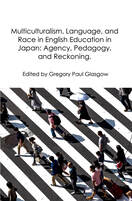Chapter 8: Outsider Teachers? Filipino Teachers’ Reflections on English Teaching and Raising Intercultural Awareness in Japan by Tricia Okada
Abstract
The issues of Filipino teachers, other so-called ‘nonnative’ English language speaking teachers (NNESTs), and native-speakerism in Japan have recently become commonly researched themes. Through analyzing open-ended questionnaires and interview data, the author presents a conceptual frame to examine the intersectionality of race, identity, and teaching ability by describing how participants—without initially having any English language teaching background—present their pedagogical approaches and perceive their agency. She draws from Makris’s definition of outsider teachers, or those who may have roles that are more contextually dependent than static, but may also possess “insider” characteristics. By exploring this notion of outsider teachers, Okada contends that Filipinos who become English teachers negotiate these roles in a myriad of ways.
About the Contributor
Tricia Okada is an associate professor at the Center for English as a Lingua Franca, Tamagawa University. She received her bachelor’s degree in speech communication and theater arts from the University of the Philippines, her master’s degree in Sociology of Communication from Osaka University, and PhD in International Studies from Waseda University. Her research interests are gender, migration, sociolinguistics, and English as a Lingua Franca.
Citation
Okada, T. (2023). Outsider teachers? Filipino teachers’ reflections on English teaching and raising intercultural awareness in Japan. In G. P. Glasgow (Ed.), Multiculturalism, language, and race in English education in Japan: Agency, pedagogy, and reckoning (pp. 204–225). Candlin & Mynard ePublishing. https://doi.org/10.47908/26/8
The issues of Filipino teachers, other so-called ‘nonnative’ English language speaking teachers (NNESTs), and native-speakerism in Japan have recently become commonly researched themes. Through analyzing open-ended questionnaires and interview data, the author presents a conceptual frame to examine the intersectionality of race, identity, and teaching ability by describing how participants—without initially having any English language teaching background—present their pedagogical approaches and perceive their agency. She draws from Makris’s definition of outsider teachers, or those who may have roles that are more contextually dependent than static, but may also possess “insider” characteristics. By exploring this notion of outsider teachers, Okada contends that Filipinos who become English teachers negotiate these roles in a myriad of ways.
About the Contributor
Tricia Okada is an associate professor at the Center for English as a Lingua Franca, Tamagawa University. She received her bachelor’s degree in speech communication and theater arts from the University of the Philippines, her master’s degree in Sociology of Communication from Osaka University, and PhD in International Studies from Waseda University. Her research interests are gender, migration, sociolinguistics, and English as a Lingua Franca.
Citation
Okada, T. (2023). Outsider teachers? Filipino teachers’ reflections on English teaching and raising intercultural awareness in Japan. In G. P. Glasgow (Ed.), Multiculturalism, language, and race in English education in Japan: Agency, pedagogy, and reckoning (pp. 204–225). Candlin & Mynard ePublishing. https://doi.org/10.47908/26/8

Information About the Book
Title: Multiculturalism, Language, and Race in English Education in Japan: Agency, Pedagogy, and Reckoning
Editor: Gregory Paul Glasgow
Publication date: March 2023
Read more...
Title: Multiculturalism, Language, and Race in English Education in Japan: Agency, Pedagogy, and Reckoning
Editor: Gregory Paul Glasgow
Publication date: March 2023
Read more...
